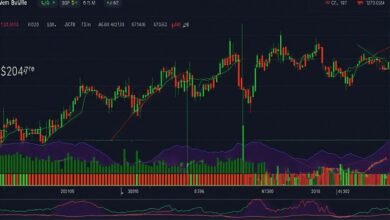VUG Stock: A Comprehensive Guide

Introduction
When it comes to growth investing, VUG stock is a popular choice among investors. VUG, or the Vanguard Growth ETF, offers a diversified portfolio focusing on high-growth potential companies. This comprehensive guide will walk you through everything you need to know about VUG stock, from its benefits and risks to performance and how it compares to other ETFs.
What is VUG Stock?
VUG stock, short for the Vanguard Growth ETF, is an exchange-traded fund managed by Vanguard. It aims to track the performance of the CRSP US Large Cap Growth Index, which includes U.S. companies with high growth potential. Investing in VUG stock means owning a piece of a diversified portfolio of growth-oriented companies.
Benefits of Investing in VUG Stock
One of the primary benefits of VUG stock is its exposure to high-growth companies. These companies typically reinvest their earnings to fuel further growth, potentially leading to significant capital appreciation. Additionally, VUG stock offers diversification, reducing the risk associated with investing in individual stocks.
Risks Associated with VUG Stock
Like any investment, VUG stock comes with risks. Growth stocks can be more volatile compared to value stocks, meaning VUG stock might experience more significant price fluctuations. Economic downturns can impact the performance of growth stocks, including those in VUG’s portfolio. Investors should be aware of these risks before investing in VUG stock.
Historical Performance of VUG Stock
VUG stock has demonstrated strong historical performance, often outperforming many other ETFs focused on different investment strategies. By examining the historical returns of VUG stock, investors can gain insights into its long-term growth potential. It’s important to remember that past performance is not indicative of future results.
Comparing VUG Stock with Other ETFs
When comparing VUG stock to other ETFs, it’s essential to consider factors such as expense ratios, holdings, and performance. VUG stock typically has a lower expense ratio compared to actively managed funds, making it a cost-effective choice. Additionally, comparing VUG stock’s holdings with other ETFs can provide insights into the specific sectors and companies driving its performance.
How to Buy VUG Stock
Purchasing VUG stock is straightforward and can be done through most brokerage accounts. Investors can buy shares of VUG stock just like they would with any other publicly traded stock. It’s important to consider the timing and market conditions when buying VUG stock to maximize potential returns.
VUG Stock in a Diversified Portfolio
Incorporating VUG stock into a diversified portfolio can enhance growth potential while mitigating risk. By combining VUG stock with other asset classes and investment strategies, investors can create a balanced portfolio that aligns with their financial goals. VUG stock’s growth focus makes it a valuable addition to a well-rounded investment strategy.
Analyzing VUG Stock’s Holdings
Understanding the holdings of VUG stock can provide insights into its performance drivers. VUG stock typically includes companies from sectors such as technology, healthcare, and consumer discretionary. By analyzing these holdings, investors can better understand the growth potential and risks associated with VUG stock.
The Role of VUG Stock in Long-Term Investing
For long-term investors, VUG stock can be a powerful tool for capital appreciation. The focus on growth stocks means VUG stock has the potential to deliver substantial returns over an extended period. Investors with a long-term horizon can benefit from the compounding growth of VUG stock.
VUG Stock and Market Trends
Keeping an eye on market trends can help investors make informed decisions about VUG stock. Economic indicators, industry developments, and changes in market sentiment can all impact the performance of VUG stock. Staying informed about these trends can help investors optimize their investment strategy.
Conclusion
VUG stock represents an excellent opportunity for investors looking to capitalize on high-growth companies. While it comes with certain risks, the potential rewards can be significant. By understanding the benefits, risks, and historical performance of VUG stock, investors can make informed decisions about incorporating it into their portfolios. Whether you are a seasoned investor or just starting, VUG stock can play a crucial role in achieving your financial goals.
FAQs
1. What does VUG stock stand for?
VUG stock stands for the Vanguard Growth ETF, which focuses on large-cap U.S. growth companies.
2. Is VUG stock a good investment for beginners?
VUG stock can be suitable for beginners due to its diversification and focus on high-growth companies, but investors should be aware of the associated risks.
3. How does VUG stock compare to other Vanguard ETFs?
VUG stock is growth-focused, while other Vanguard ETFs might focus on different strategies such as value investing or dividend growth.
4. What sectors does VUG stock primarily invest in?
VUG stock primarily invests in sectors like technology, healthcare, and consumer discretionary, which are known for their growth potential.
5. Can VUG stock be part of a retirement portfolio?
Yes, VUG stock can be part of a retirement portfolio, especially for investors seeking long-term growth and willing to tolerate some volatility.




